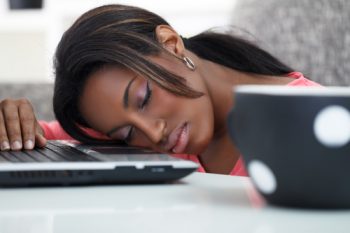Snoring is one problem. Sleep apnea is another entirely. But snoring can be one of the signs of sleep apnea, an often undiagnosed sleep disorder. This should concern you, not only because the problem interrupts a good night’s sleep, but because sleep apnea has been linked health complications such as hypertension, irregular heartbeat, stroke, and heart attack.
Common Signs of Sleep Apnea
Here are just some of the signs that could indicate you suffer from undiagnosed sleep apnea:
- Feeling tired all the time. Even if you don’t know you’re waking up throughout the night, your brain knows it, and the result is exhaustion. Disrupted sleep cycles lead to serious tiredness. It’s important to look at all the symptoms you’re experiencing because exhaustion could be part of a sleep apnea diagnosis or an indication of other health problems.
- Incredibly loud snoring. Snoring and sleep apnea are not inseparable, but obnoxious and super-loud snoring is often one of the major signs of undiagnosed sleep apnea. When an airway is blocked or partially collapsed – a fixture of sleep apnea – the snoring sound occurs. Gasping or snorting while snoring could indicate a serious sleep disruption, as this is an indication that your body is working to start breathing properly again.
- Sleep deprivation is a major cause of mood swings. A horrible night of sleep (ask any parent of a newborn) does not a happy camper make the next day. Experience this lack of quality sleep night after night because of sleep apnea and moodiness could become a constant.
- Memory problems. Issues with concentration and memory are a direct result of sleep apnea. Your body needs restorative sleep to function properly, including memory function.
- Morning headaches. Being deprived of oxygen at night because of sleep apnea can cause the sufferer to wake with a pounding headache.
- Dozing off anytime the opportunity presents itself. Some people proudly boast that they can fall asleep anywhere anytime, but this reality is only awesome among babies and toddlers. Adults who can’t stay awake could be exhibiting signs of sleep apnea exhaustion.
- Getting up during the night to use the bathroom. Being in a lighter stage of sleep because of the sleep apnea means your body may recognize that you have to pee, instead of knowing to wait until morning to go.
Suffering from exhaustion and mouth pain? Is it TMJ or sleep apnea? >>
The Diagnosis of Sleep Apnea
Diagnosing sleep apnea requires a bit of time. Depending on the severity of your symptoms and your doctor’s belief that undiagnosed sleep apnea is the culprit behind your symptoms, you may need to do a sleep study to get an accurate count of the number of times you stop breathing in your sleep.
Your dentist may also be able to see that you absolutely have blockages that are contributing to a sleep disorder. In cases like this, oral surgery may be necessary to minimize or correct the problem. Otherwise, there are a few common treatments for sleep apnea. A CPAP machine requires the sufferer to wear a mask that pushes air through the existing blockage. An oral appliance is a simpler method of bringing the jaw forward to open the airway.
Suspect that you’re living with undiagnosed sleep apnea? Visit Dr. Carole Sherrod Jewell at Red Bank Dentistry. She is experienced in treating sleep apnea cases, and has a deep understanding of the tissues of the mouth and physiology of the jaw. Make an appointment to talk about your concerns and get on the path to a good night’s sleep and better health.



